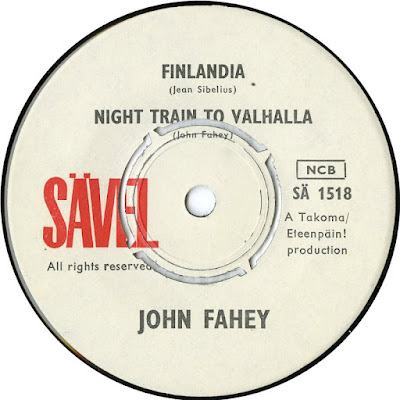John Aloysius Fahey (February 28, 1939 – February 22, 2001) was the "Father of the American Fingerstyle Guitar," who spent the last twenty years of his life in Salem, Oregon. During his career, he recorded more than forty albums, appeared on numerous others, wrote articles and liner notes, and produced many recordings and videos. He was a Grammy Award winner, and in 2003 was ranked thirty-fifth in Rolling Stone's "100 Greatest Guitarists of All Time."
 |
| John & his mother |
Already a collector of rare early blues and country music, he made his first album in 1959, ascribing part of it to the pseudonymous "Blind Joe Death." Only 95 copies of the LP were pressed, making it a coveted collector's item today. (In the 1960s, Fahey would re-record the material for wider circulation.) With degrees in philosophy and religion from American University, Fahey moved to California to attend graduate school. He received a master’s degree in folklore from UCLA in 1966, writing his thesis on blues master Charley Patton. His book on Patton was published in 1970.
Fahey paved the way for the development of a distinct style of music known as American fingerstyle guitar. He introduced psychology and spiritualism into his music and was a pioneer of what came to be known as "New Age" music. Fahey’s compositions also embraced musical elements of other cultures, and he discovered and promoted musicians such as Bukka White, Leo Kottke, and George Winston. A pioneer in alternative or “indie” music, he formed Takoma Records in the late 1950s, naming the company after his childhood home of Takoma Park, Maryland. The company was one of the earliest independent labels to successfully challenge the corporate music model.
Here's "Night Train To Valhalla"
Fahey remained consistently popular on a cult level through the mid-'80s. His most commercially successful efforts, oddly, were probably his Christmas albums, which are among the more interesting holiday records of any genre. For a time he ran the Takoma label, where he was instrumental in starting the career of Leo Kottke (who owes much of his stylistic inspiration to Fahey), as well as promoting lesser-known talents like Robbie Basho.
He was a catalyst in other subtle ways, helping to form Canned Heat by introducing Al Wilson (who played on a Fahey album in 1965) to Bob Hite, and rediscovering Delta bluesman Bukka White with his friend Ed Denson. Fahey sold Takoma to Chrysalis in the mid-'70s, but continued to record regularly, and also tour (though his live performances were erratic).
In June 1981, John and his third wife Melody moved from Los Angeles to Salem, a city he said reminded him of the town where he grew up. In 1986, he contracted Epstein-Barr syndrome, a long-lasting viral infection that, combined with diabetes and a continuing drinking problem that had begun in the mid-1970s, sapped his energy and resources.
After he and his wife separated in 1990 and divorced in 1992, Fahey lived in a hotel room. Although the Epstein-Barr virus was finally overcome, the mid-'90s found him living in poverty in Oregon, where he paid his rent by pawning his guitar and reselling rare classical records. When he could no longer pay for medical care, he moved into the Union Gospel Mission in downtown Salem.
In spite of these hardships, Fahey’s last years were filled with creative pursuits that included painting, composing, and collecting records. The appearance of a major career retrospective on Rhino, Return of the Repressed, in 1994 boosted his profile to its highest level in years. He recorded with the John Fahey Trio and in 1995 started Revenant Records with an inheritance from his father's estate. In 1997, he returned to active recording with City of Refuge and was planning a Revenant definitive package of Charley Patton's work when he died in Salem following sextuple-bypass surgery on February 22, 2001, at the age of 61.
During the later years of his life, Fahey painted a series of abstract paintings. Many of these were exhibited from July 10 to September 12, 2010, at The East Village, New York, presented by John Andrew and Audio Visual Arts (AVA).The exhibit featured 55 paintings, ranging in size from 6.75" by 9" to 22" by 29". The "sale sheet" for the exhibit listed prices from $750 for smaller works to $3,000 for the large paintings.
The Fahey discography is dauntingly large and diverse; the neophyte is advised to start with the two-disc Return of the Repressed, but those who wish to dig deeper will be very pleased with Takoma's extensive reissues, which started to appear in the late nineties.
(Edited
from Oregon Encyclopedia, AllMusic & Wikipedia)























































